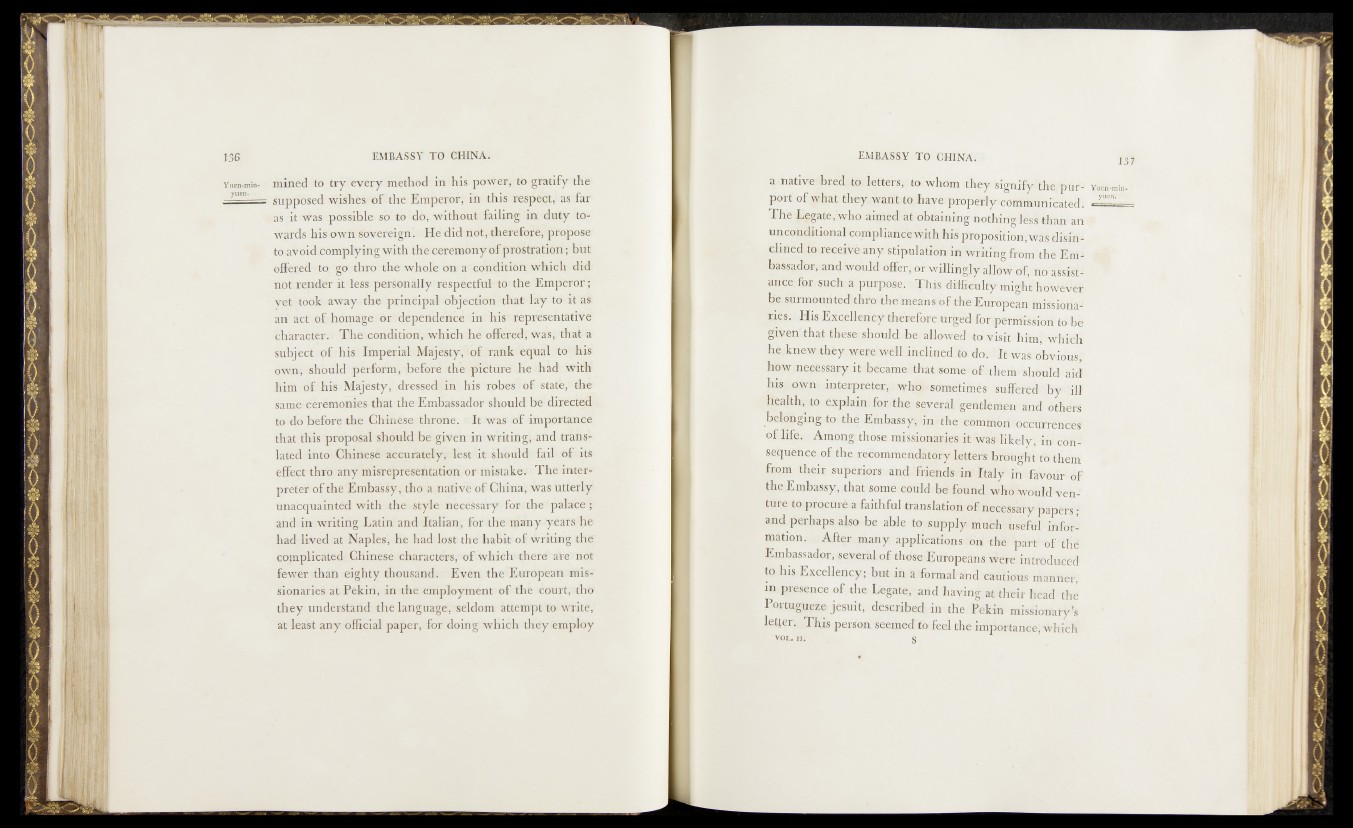
Yueiïrmin-
,- '^IpLehs^ir'/
EMBASSY -TO' CHINAmined
to tryievery method in* his power; * tofgratify the
|supposed wishes of the Emperob; in this res’pebt,* as far
t,as i it was possible so to do, withduti faiLing in: duty io-
wards his own fovereigni He did net, therefore, propose
to avoid complying with the ceremony o f prostration pbhtf
offered^?to go tliro 'A® whole'ona condition which did'
noterendbr it less personally : respectful- to the EfflpOrbir;
yet- took away-the principal • objection -that Iffy to* it | p
art act of homage h r dependence in his* tepresenta'tiY©
character.« The condition, which he offered5, Was, that a
subject of his Imperial Majesty, oJLrank eq u al‘to * his
own, should perform,’heiorb the p ic tu re f i& ta f with
him of his Majesty, dresseetein his ’robesfofi-stftbytfe>
saT^fe^remonies that'dfe-Embassador^hould feldire'cte£h
to do b ^ r e the: Ghihfse? th ro n e.' It was’of importance
that this proposal should be given in writing; -and tb&ns^
latfed into Chinese accurately;;llfest i t shbiitil'-fkil ©fe&tsf*
effect thro/any misrepresentation ofrmlstakev The>inte#
preter of the Embassy, thoianatfvbsof CbinayWas ritteily
unacquainted with the style necessary-for the pate#§>
and in writing JLatin’ andTtallan!, #NS4he many4y@i#s h®
had fbȤ4at Naples, he had, lost the habit of writlMg'fh^
complicated Chinese characte'usysbfwhichther#a9:eP ridf
fewer than eighty ftousanribsoEven thedBuropean
Skaiaries at Pekin, in the employment of the ■cburt, thb'
they understand the languagb^eldom attempt m write,5
at least any official paper, for doing which they employ
EMfBAfSÄY ffTO CHINA. W
a <hativ£SHbredi'toiefèl5ers^tbiwhbm thS^s%n%athê|puri- y ^ tote-
pobb ©f what - yaen‘ -
Thfe'^ate/whnaimfeêéfe ®h(hiniingm>qeMngiteiiam an/#
uneoitditionaheonipbaff&s^thhis propoiïibr^Wa’«
Gbnedio^eGeibè'.anytfeljlpiala.tiom' irrfwritirrg fibSÉNfif»HrI .$
b a ss a d oE n a n dw o hm m ffe r^w illin l^M o f/n d < S ü ti ’
a%%ferv suchba pw^^e.^ This d iffi/cW tym ig h ^ h ^ è ^ ''
be’Surm@udtedilhiio4he;mem®M4ffe«b%%^n>mM#a^
H P ' HisEscellenéy therefore brg|dCfo,iqpe«MSfolll?
given: that ^< ^m n ltfeH ^ alio ^ ^ ||fe^ ^ ^M te',bwh ife1 i
h i jknew/toKey^ypreiwaï: iwcji«ed,fe,'d'öul It
few ta ^ a ^ y ff(^A 9 a fo e #% fe n ^ ^ « th ê ïfe> fe te fé iM#
hii^ ®Wna 'interpreter,;i who- tsdMlimi's ,%ulF%ii?by^®
%a;hhv to /explaihiforathe^^eldp^Jlfei^HJfffiiel
■fel^ging-to-j&é E m b a ^ - ^ o ^ r f f e b r n m o r i^ ^ ^ iS iS
fSil^esi Among those missfonariesrit
S#0|§03wtf the ^umm©n.d&t|f,y letters b fo h p b t^ th ëM
from their superiors anff 'friends i ^ I t a l ^ i h ^ f a i b ^ f
th#Embassyy’thays^mé^ufo'bèfound:wh^vonM^ëïï-f
tube tQtpipcuE&a' faithful translation ohnëéöSsafy papefs^
and perhaps.,also be able f o n s u ^ ^ r n y f e M h i d l « #
motion. After- many applicafabs&h the
Embassador,* (several;ofthbse>Eu<Fopfc,ihs»^e°rëdrftrÖdöè’M'
tQ.hisrfcellèricy; but; in S lfo rA a fa n d ^ u ii^ ikm m r,
foygpsence of the Legate,-arid haying|*llrelf
Pojtngte-ejjesuit, dasjsrifediimthe Pekin midioffesjds
letter: This,person seemed'toriesl .the importaneèpwhich'
|yyoL, tr, I »1 * -